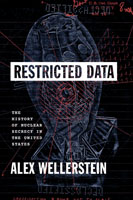How much does the nuclear complex cost the American taxpayer? In a post last Thursday, Mia Steinle and Danielle Brian of the Project on Government Oversight wrote about the fact that the exact cost of the U.S. nuclear complex remains an unknown figure to taxpayers. (“Taxpayers Left in the Dark When it Comes to Nuclear Weapons Spending,” POGO, December 1, 2011.) They describe a debate between the Obama administration and groups trying to come up with realistic estimates for the numbers:
So, how much does the U.S. spend on nuclear weapons? The only way to know for sure—and the only way for Congress to make informed decisions about funding—is for the administration to be more transparent about its nuclear spending, and to make a complete, detailed budget available to the public that includes operations, tactical nukes and other costs borne by the taxpayer. We also need a GAO audit of that budget, because right now, the one thing we do know is that we do not know enough.
There’s a way in which billions and billions just seem like lots of numbers with zeros attached to them, though the difference between “$700 billion over ten years” (one estimate) and “$200 billion” (official estimate) is pretty large. Half a trillion is quite a lot of zeros.
What accounts for the disagreement? Interestingly, classification and secrecy appear to play a very small role. While all sides acknowledge that there are some classified programs that aren’t being listed, it seems to me that everybody is more or less in agreement that most of the expenditures are more or less in the open. The question is not so much a matter of what’s being paid for, but how much everything will eventually cost, and whose figures you trust on that point.
So that’s interesting to me. The old debate on the price of the nuclear complex was based on classification and inconsistent record keeping. The new debate is a question of how much these large technical systems are actually going to cost and how many factors over budget they will be — POGO claims that a DoD project costing six times its initial estimate is not unusual.
All of this invokes for me the initial big, black budget request of the Manhattan Project. It was one of the earliest invocations of unusual secrecy in the project, as well. Vannevar Bush wrote to President Roosevelt at the end of 1942, telling him that accelerating the “special project” from a feasibility study (can a bomb be built?) to a development program (actually making a bomb) would cost $400 million (1942 dollars; between $5 and $10 billion today depending on how you calculate it). 1
Bush’s exact language to Roosevelt was as follows:
Especially we need our instructions as to whether this program is to be vigorously pushed through. It would be ruinous to the essential secrecy to have to defend before an appropriations committee any request for funds for this project and it is therefore recommended that some time in the spring you request the Congress for the needed funds ($315,000,000 [in additional to what had already been allocated]); such funds to be expended at your discretion.
In other words, if you want the bomb, you’ve got to pay. If you want to pay, you’ve got to do it from secret funds. Roosevelt of course agreed. He was the one who had requested that the bomb be kept ultra-secret to begin with — explicitly far more secret than any other military project.
Take a look at that one more time. Who is the secrecy keeping the information from? Congress. Why? Because if you’ve decided you need to keep the bomb project a secret from Germany, then you can’t have Congress poking around in it, because Congress is traditionally as leaky as a sieve. Other correspondence shows that Bush was particularly afraid that no appropriations committee would ever be able to understand that the atomic bomb was not just science fiction, and was a worthwhile gamble. (And he was probably right — it was not a conservative approach to fighting the war at all.)
So there we go down the secrecy rabbit hole — our fear of the enemy (the Nazis) leading to secrets being kept from our own agencies of oversight (Congress, much less “the public”). When the fact that there is a secret is also itself a secret, this sort of dynamic played out again and again.
Bush and Roosevelt eventually did let a handful of Congressmen in on the secret, just to grease the budget procedures. They did not include Senator Harry Truman, who spent years trying to audit the Manhattan Project before becoming Vice President. Truman did, however, come to some understanding of the goal of the project, and, as David McCullough points out in his biography of him, did actually leak it to a constituent. So perhaps Bush and Roosevelt’s fear of Congressional leaking was justified.
Interestingly, Bush’s $400 million estimate for the atomic bomb was off by quite a lot. The final cost of the Manhattan Project was around $2 billion (1945 dollars, $20-40 billion current dollars)… in other words, around five times the initial estimate. Sound familiar? That’s almost the same factor of budget overruns cited by POGO. So while some things change — less secrecy around the bomb budget — some things stay the same.
Update: Stephen I. Schwartz (the editor of Atomic Audit, which I’m pretty sure has been my most-referenced book on this site so far), posted an additional statement about this to Glenn Kessler’s initial article. Stephen’s statement is here. I think Stephen does a great job in making clear that the issue here is about the lack of willingness to track down all of the associated expenses of the nuclear weapons complex (spread out amongst dozens of different bureaucratic entities). Similarly I think he makes a good point about the fact that the nuclear weapons complex has been extraordinarily expensive — probably “the third most expensive government program of all time” — which makes not having good, vetted official figures on its actual cost a little unacceptable. Lastly, I had meant to make a reference here to a recent XKCD comic which attempts to visualize large sums of money. The nuclear weapons program is visible in the middle of the rightmost column — it’s quite a lot!
- I tend to prefer the high end figures, not just because they are more impressive, but because the Manhattan Project was a large capital project, and the GDP Deflator is a better index for making sense of how much that was worth at the time, not the Consumer Price Index. Simply put, atomic bombs are not really consumer goods. At least not for most people. See Measuring Worth’s page on Choosing the Best Indicator for a great overview of the different ways of making sense of past prices.[↩]


Nice blog entry, Alex. I also profitted from the link to the site about how to calculate past costs. Very helpful and more flexible than the standard CPI. Cheers, P.
[…] at any time when resources are considered scarce — which is always. (See my previous post on the Origins of the Nuclear Black Budget for a discussion of these kinds of […]
[…] of being challenged after the fact. With the great secrecy of the Manhattan Project, and its “black” budget, high priority rating, and its lack of tolerance for any external interference, came a great […]